Engaging in conversation about Etuaptmumk (a two-eyed seeing approach) to Indigenization and understanding equity, diversity and inclusion.
They will also address the challenges and opportunities that exist in New Brunswick and Atlantic Canada, the need to build safe spaces and how sharing stories can lead to collective action that moves community forward.
We all have a voice and an important role to play in this work.
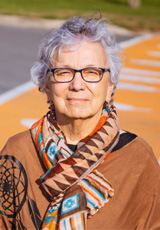
Opolahsomuwehs (Imelda) Perley is Wolastoqew (Maliseet) from Tobique First Nation, St. Mary’s First Nation and Houlton Band of Maliseets (United States). Dr. Perley is retired from her position as Elder-In-Residence for the University of New Brunswick.
She holds a B.A. and an M.Ed. both from the University of New Brunswick. She is a fluent speaker of Maliseet, her first language. Imelda has taught Maliseet language and Wabanaki Worldview courses at University of New Brunswick and University of Maine. She has also co-taught a Native Studies module at Saint Thomas University. She is founder and coordinator of the Wolastoq Language and Culture Centers Inc., situated at Tobique and St. Mary’s First Nations. The primary purpose of each center is to promote Wolastoq language, culture, traditions, worldviews, and ceremonies. Each center also conducts workshops that provide information pertaining to history, social, economic, political, and cultural conditions of Wolastoq communities. Imelda remains active in promoting cross-cultural awareness sessions within the public domain.
Her traditional roles within the community include Sweatlodge Keeper, Medicine Wheel Teacher, Sacred Pipe Carrier, and Keeper of the Women’s Ceremonies (e.g. Puberty, Naming and Fasting). She is a cultural advisor for community organizations, provincial and federal agencies. Her acquisition of traditional knowledge from the Elders and other cultural teachers has prompted her to remain active in environmental and cultural issues.
To date, Imelda has been acknowledged for her language and cultural contributions through many awards, certificates and medals. Most recently, Imelda was one of Canada’s 150 Ambassadors and continues to share with Canada her language through language teaching tweets. In 2012, Imelda received the Queen Jubilee Medal for community service. She was also awarded the 2017 Governor Generals Sovereign Medal for Volunteers for delivering language and cultural activities. Maine State Legislative Assembly also recognized her dedication to language revitalization efforts within both university and community programs. In May of 2019, Imelda received an honorary doctorate of letters degree from University of New Brunswick for her “incredible work contributing to the support, education and visibility of Indigenous peoples at UNB and across the province.

Anne-Marie Pham has worked with diverse communities and workplaces for over 20 years. She has a deep understanding of issues and opportunities related to diversity and inclusion, and specializes in mobilizing, educating and sharing the latest research and promising practices on equity, diversity and inclusion in the workplace. Anne-Marie brings a unique set of skills and perspectives having worked as a diversity and inclusion lead for Spectra Energy and the City of Calgary, and as a trainer and facilitator for Human Resources and Skills Development Canada. She has provided dynamic presentations, training and consulting services to clients from a wide range of industries in the business, public and non-profit sectors.
Anne-Marie has a master’s degree in public administration (MPA), a BA in Sociology and a senior HR Professional certification with the Society of Human Resource Management (SHRM). She is also a certified administrator of the Intercultural Development Inventory (Tool).
Anne-Marie is a wife and mother of two, as well as an avid community leader, supporting civic participation, mentoring and leadership development especially among immigrants, visible minorities, women and youth. In 2013, she received the Queen’s Diamond Jubilee award for her community service. In December 2017, Anne-Marie was appointed to the Board of Directors of the Canadian Race Relations Foundation (CRRF), a Crown Corporation dedicated to working towards the elimination of racism and all forms of racial discrimination.
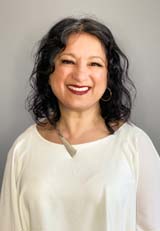
Manju Varma, Ph.D. moved to Canada with her family at the age of two and grew up in Moncton, NB. She obtained her doctorate in anti-racist education from the Ontario Institute in Education/University of Toronto. For the past 30 years she has focused on issues around diversity and anti-racism in New Brunswick and has published both national and internationally on the topics of mental health, diversity & youth and anti-racist education.
From 2001-2008, she was an Assistant Professor with the University of New Brunswick. Later she joined the Federal government and has worked at Canadian Heritage, Correctional Services Canada, and currently, is the lead for the Office of Inclusion, Equity and Anti-Racism at the Atlantic Canada Opportunities Agency. She is also a certified Conflict Mediator (Harvard Law School) and Negotiator (Dalhousie University).
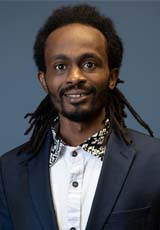
Yusuf Mohamed Shire is originally from Somalia and has lived in Fredericton for over 15 years. He is a dedicated Pan-African, committed to working on shared liberation for all communities of African descent, as a racial justice advocate and African community organizer. Yusuf is currently the President of the New Brunswick African Association Inc, a volunteer led organization working tirelessly to support the African immigrant communities in NB. Yusuf is the Founder of the African Fusion Catering Group.
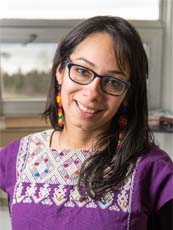
Hepzibah Muñoz-Martínez joined UNB Saint John in 2010. Prior to joining the Department of History and Politics, she taught in the International and Political Studies program at El Colegio de San Luis, and in the Political Science department at the University of Victoria and Simon Fraser University. She was also a visiting research fellow at El Colegio de la Frontera Norte.
She teaches courses in Global Political Economy, International Development, Politics of Violence, Urban Politics and Latin American studies. She designs her courses to engage students in their learning, placing a great deal of emphasis on students’ participatory involvement. A number of her courses thus incorporate experiential, team and community-based teaching techniques. This includes students’ involvement in local policy projects and human rights awareness campaigns.
Her research interests focus on the politics of violence in Mexico in order to understand the connections between economic inequality and physical insecurity in the northeastern region of this country. Her research interests also include the politics of finance in the Global South. Her work in this area identifies the social forces and the power relations in financial markets and their effects on public policy and society in Latin America.
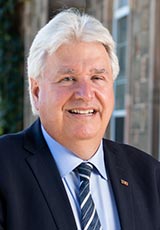
Dr. Mazerolle is the 19th president and vice-chancellor of the University of New Brunswick.
Prior to his appointment in July 2019, Dr. Mazerolle was previously the pro vice chancellor (arts, educton and law, 2009-2019), campus provost for Mount Gravatt campus (2009-2019), director of the Violence Research and Prevention program (2006-2019), and director of the Key Centre for Ethics, Law, Justice and Governance (2007-2009) at Griffith University in Queensland, Australia. He was also director of Research and Prevention at the Queensland Crime and Misconduct Commission (2002-2005) and head of the criminology program at the University of Queensland (2000-2006).
Dr. Mazerolle received his bachelor of arts degree in sociology from the University of New Brunswick (1989), his master of science in criminal justice from Northeastern University (1990), and his PhD in criminology from the University of Maryland at College Park (1995).
An active scholar in criminology, Dr. Mazerolle has led several funded research projects. His research examines processes that shape offending behaviour across the life-course. His primary focus is in building knowledge on violence to inform theories, advance understanding, and improve policy and practices to reduce or prevent violence.